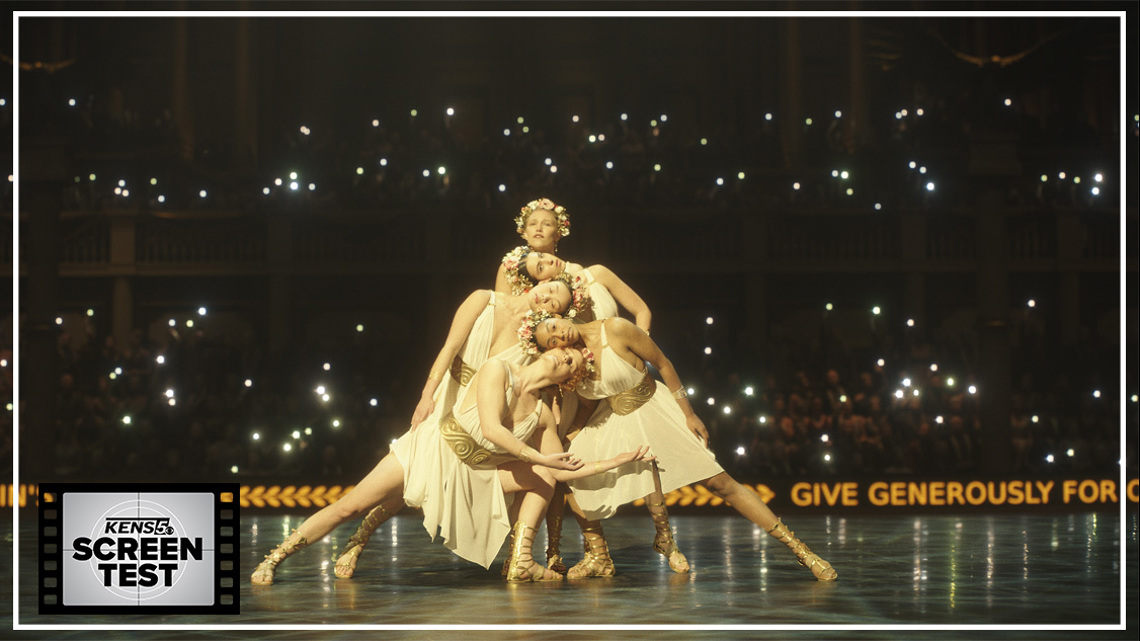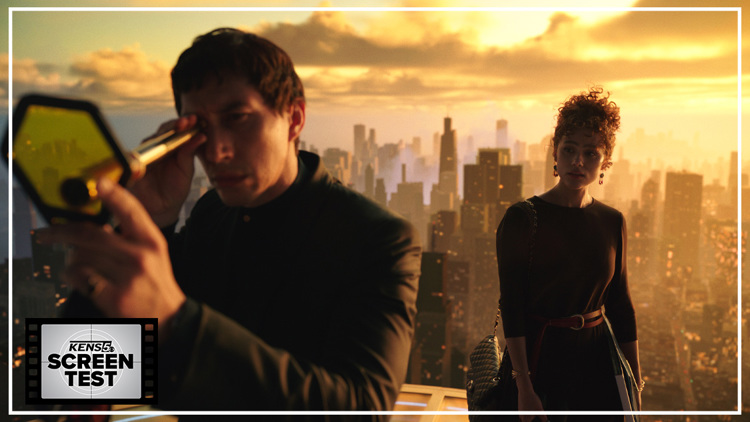USA, — Hollywood releases many hundreds of movies in any given year. We should be so lucky that at least one of those annual offerings is as inexplicable, unwieldy, unpredictable and veritably one of a kind as Francis Ford Coppola’s “Megalopolis.”
Part of the reason for that is because “Megalopolis,” for all its manic and self-distracting fervor, is a kaleidoscope of cinematic reference. It’d take less time to describe what the movie aesthetically isn’t than what it is over the course of 138 minutes (same goes for the plot). There are disorienting drug trips that evoke the German expressionism of the early 20th century; glinting costumes fit for Coliseum spectacle; shadows and shades of urban noir; title cards and orchestral sweep borrowing from the silent era; shimmering environments honoring the wobbly early years of computer-generated effects; throttling images of uprising fit for any historical moment of unrest, although the tell-tale red ballcaps directly suggest more recent events as inspiration. “Megalopolis” takes after all eras—sometimes clashing them together in the same frame, sometimes frustratingly, sometimes stunningly. The clearest thing about this disorienting movie is that it represents a work of cinematic ecstasy for its director.
That the same isn’t destined to be said for audiences, at least not on the broad scale guaranteeing success at the box office, CinemaScore meter or even Academy Award prognostications, reflects an era when our biggest commercial movies are generally some of our most schematic. We want to know what a movie will give us, and God forbid we leave with any questions beyond who we just saw in a post-credits Easter egg. A fair warning, then: I had many questions leaving “Megalopolis,” including whether what I just saw was successful or not. I now think the most thrilling thing about the movie is that it renders that question moot, ultimately unburdening itself through Coppola’s uncompromised artistry; the timelessness of his convictions; and the understanding that if its ostensibly ill-fitting expansiveness verges on disaster, then it’s worth asking – as Adam Driver’s architect does while imagining the future – why we’d ever think to limit ourselves in the first place.
The easy answer is we’re worried about bloodying ourselves by scraping up against those limitations. But don’t tell that to Driver’s Cesar Catalina, who leads the Design Authority of this movie's New Rome – a glitzy and rambunctious version of New York – with a certain celebrity that is without limits when it comes to ambition or casual selfishness. And are we sure one isn’t simply fueling the other? An early scene sees Cesar’s ambiguous utopian objectives for the future impacting the present in the form of a crumbling apartment building, worsening his reputation with New Rome's citizenry and making him a bigger target of Mayor Cicero (Giancarlo Esposito).
Regardless, it’s hard not to take Cesar’s side in an early philosophical debate in a sun-draped room suspended over the city, and to at least appreciate his gumption when Cesar interrupts Cicero’s press conference by bursting into Shakespearian monologue, drawing the curiosity of Cicero’s daughter, Julia (Nathalie Emmanuel), and the skepticism of Aubrey Plaza’s intrepid socialite/reporter, equipped with a penchant for chaos as gobsmacking as the character’s name, Wow Platinum. Also in the room is Shia LaBeouf as Cesar’s powder-keg cousin; Jon Voight as the wealthy banker Hamilton Crassus; and Laurence Fishburne as Cesar’s loyal right-hand man, Fundi Romaine, whose first interjection of baroque voiceover narration sets the stage: “When does an empire die?”
New Rome will undergo a transformation when “Megalopolis” is all said and done, to be sure, thanks to the powers of man, the fruits of this world’s more magical corners and the cosmic might hurtling towards the city from above. So too will the dynamics in that early scene introducing our ensemble scramble, tangle and tango in an unorthodox storytelling rhythm that keeps the audience at attention, compelling us to draw on our elemental understanding of movies: that a kiss means love, a shadowy stalker means trouble and fleeting gold-hued visions of the future herald potential triumph, so long as the city’s restless denizens don’t set the foundations ablaze first.
The 85-year-old Coppola thought about and wrote and rewrote his "Megalopolis" script for decades before production finally got underway. It’s tempting to think the film strips things down to the narrative essentials – to the point you wonder if you missed a scene before Julia suddenly starts working for Cesar or when his phantasmagorical, shapeshifting element of “megalon” is introduced – because the filmmaker got fed up trying to logically connect one awe-inspiring set piece to another. Romance, garish comedy, scandal, citywide fury… New Rome makes room for it all, as if trying each flavor to see what suits it best.
But “Megalopolis,” for all its eagerness to ignite or defuse its intimidating range of tones and plotlines with the primal daring of a bungee jumper, feels more intentional than that, and as a result more daring. In freeing his performers to embellish their characters with the vividly distinct textures the story’s scale demands (a task accepted mostly with success), Coppola is able to populate his lavishly imagined New Rome with characters defined not primarily by the story as it’s developed thus far but by how the movie’s thrillingly alive world responds to their actions. That creates an urgency, a danger, a sumptuousness and a deeply visceral unpredictability—all things fit for a film about unmooring oneself from the familiar to reach transcendence.
Take the movie’s most committed sequence at a massive Rome-inspired arena, where a conspiracy-tinged wedding ceremony becomes a chariot race that then gives way to a pop performance where audience members hold up QR codes to bid on the young starlet’s "virgin pledge." I promise you have never seen anything like it; I also promise you won’t entirely know what to make of it in the moment. “Megalopolis” can and often does feel crazed, but so does Coppola's vision of New Rome, and in its stunning blend of anachronistic elements he suggests a world (perhaps reflecting our own?) that isn’t sure about which path to take in order to seek its preferred future.


So it tilts to its vagaries, vulgarities and impulses, emboldened by Cicero’s insistence that things remain they way they are and challenged by Cesar’s calling for “a great debate about the future.” That its juxtaposition of epochal references – fashions, social transactions, ways of speaking and things deemed worth speaking about – are in near-constant collision is a refreshing foundation on which Coppola unfurls his fable, and I’m convinced it remains so even as it becomes too ludicrous to believe what's happening onscreen. But it also reflects what might be Coppola’s chief concern: that our differences will subsume us before we can find the common ground fertile enough to endure. Cesar drives through New Rome's nighttime streets shortly after the extravaganza of excess at that arena, and witnesses magnificent works of sculpted art stumble into despair.
Does Coppola, to borrow the opening line of perhaps his most iconic film, still believe in America? I think he does. But if “Megalopolis” is any indication, I think he also understands things evolve faster, swing harder, and enable more deeply than they did when he envisioned Michael Corleone losing himself to a business he swore to avoid or Harry Caul transfixed by a single conversation. Cesar instead belongs to a society pulling him in multiple directions at once, a struggle poignantly envisioned when his dead wife’s face is glimpsed in the shiny surfaces of the material he hopes to build a new world with. “Megalopolis” is willing to bruise and break its bones in order to push the limits of its intoxicating world and the medium we’re glimpsing it through. The burden of seeing what lies beyond – rightly so or not – belongs to us.



